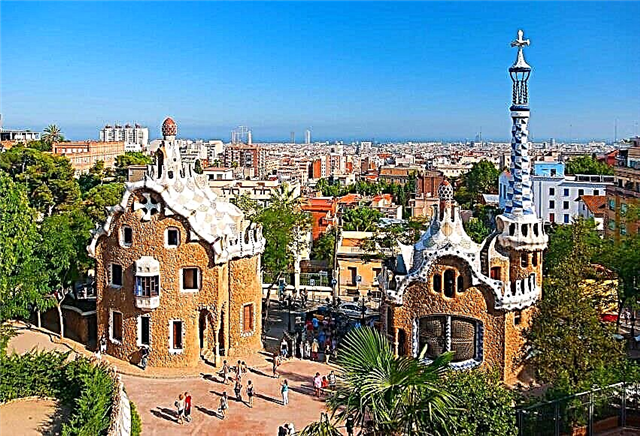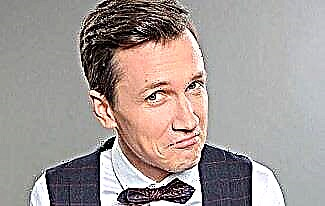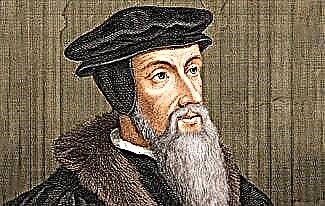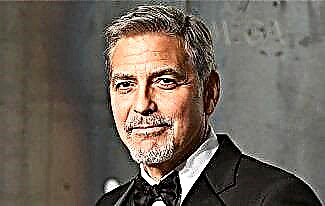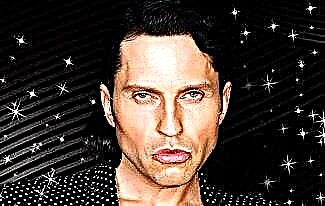Yuri Andropov (1914-1984) - Soviet statesman and politician, leader of the USSR in 1982-1984. General Secretary of the CPSU Central Committee (1982-1984).
Chairman of the Presidium of the Supreme Soviet of the USSR (1983-1984). In the period 1967-1982. headed the USSR State Security Committee. Hero of Socialist Labor.

There are many interesting facts in the biography of Andropov, which we will talk about in this article.
So, before you is a short biography of Yuri Andropov.
Biography of Andropov
Yuri Andropov was born on June 2 (15), 1914 in the village of Nagutskaya (Stavropol province). Information about his origin is still classified, probably for the reason that his mother was a Soviet intelligence officer. As a result, many facts from the biography of Andropov are being questioned.
Childhood and youth
The future head of the USSR was brought up in the family of the railway employee Vladimir Andropov, who was his stepfather. The man died in 1919 from typhus when the boy was barely 5 years old.
According to Yuri Vladimirovich, his mother, Evgenia Karlovna, was the adopted daughter of a wealthy Finnish Jew Karl Fleckenstein, who owned a jewelry store.

A woman from the age of 17 taught music in a female gymnasium.
After the death of his stepfather, Yuri moved with his mother to Mozdok. Here he graduated from high school and joined the Komsomol. By then, his mother had remarried.
During the biography of 1932-1936. Andropov studied at the Rybinsk river technical school, becoming a technician for the operation of river transport. Later he graduated in absentia from the Higher Party School under the Central Committee of the CPSU (b).
In addition, Yuri Andropov studied in absentia at the historical and philological department of the Karelo-Finnish State University.
However, after studying at the university for 4 years, he left it. This was due to his transfer to Moscow. An interesting fact is that in his youth he managed to work as a telegraph operator and even as an assistant projectionist.
Politics
While still a student, Yuri began to take an interest in politics. In the mid-30s, he was a Komsomol organizer at the Rybinsk shipyard, having managed in just a couple of years to rise to the rank of first secretary of the Yaroslavl regional committee of the Komsomol organization.
In this position, Andropov showed himself as a talented organizer and an exemplary communist, which attracted the attention of the Moscow leadership. As a result, he was instructed to organize a Komsomol youth union in the Karelo-Finnish republic formed in 1940.
Yuri stayed here for about 10 years, coping with all the tasks perfectly. When the Great Patriotic War began (1941-1945), he did not take part in it, due to health problems. In particular, he had kidney problems.
Nevertheless, Andropov helped the country in the fight against the German fascist invaders. He made a lot of efforts to mobilize youth and organize the partisan movement in Karelia, and after the end of the war he restored the national economy.
For this, the guy was awarded 2 Orders of the Red Banner of Labor and the medal "Partisan of the Patriotic War" 1st degree.

After that, Yuri Vladimirovich's career began to develop even faster. In the early 1950s, he was transferred to Moscow and appointed to the post of inspector of the Central Committee. Soon he was sent to Hungary as the Soviet ambassador.
An interesting fact is that in 1956 Andropov was directly involved in the suppression of the Hungarian uprising - an armed uprising against the pro-Soviet regime of Hungary, which was destroyed by Soviet troops.
The KGB
In May 1967, Yuri Andropov was approved as chairman of the KGB, which he held for 15 long years. It was under him that this structure began to play a serious role in the state.
By order of Andropov, the so-called Fifth Directorate was founded, which controlled representatives of the intelligentsia and suppressed any anti-Soviet attacks.
In fact, without the approval of the KGB leadership, not a single important appointment could pass in all areas, including ministries, industry, culture, sports and other spheres.
The State Security Committee actively fought against dissident and national movements. Under Andropov, dissidents were often sent for compulsory treatment in mental hospitals. By his order in 1973, the expulsion of dissidents began.
Thus, in 1974, Alexander Solzhenitsyn was expelled from the Soviet Union and deprived of his citizenship. Six years later, the famous scientist Andrei Sakharov was exiled to the city of Gorky, where he was monitored around the clock by KGB officers.
In 1979, Yuri Andropov was one of the initiators of the introduction of Soviet troops into Afghanistan. The public believed that Defense Minister Dmitry Ustinov and the head of the KGB Yuri Andropov were the main culprits in the outbreak of the military conflict.
The positive features of his work include a tough fight against corruption. His charges had very high salaries, but if he found out about bribery, then the culprit was severely punished.
Secretary General
After the death of Leonid Brezhnev in 1982, Yuri Andropov became the new leader of the USSR. This appointment was one of the most important in his political biography. First of all, he began to impose labor discipline, trying to completely eradicate parasitism.
An interesting fact is that in those years, during the daytime screenings in cinemas, police raids were carried out. Detained viewers had to be told what they were doing in the cinema during the day when all people were at work.

A tough fight against corruption, unearned income and speculation began in the country. The number of persons convicted of criminal offenses has increased. In parallel with this, an anti-alcohol campaign was launched, as a result of which moonshine was especially harshly persecuted.
And if in domestic policy Andropov managed to achieve certain successes, then in foreign policy everything was different. The war in Afghanistan and the strained relations with the United States did not allow to reduce the distrust of foreigners in the USSR.
Perhaps Yuri Vladimirovich could have solved many more problems, but for this he needed more time. It is worth noting that he led the country for less than 2 years.
Personal life
Over the years of his personal biography, Andropov married twice. His first wife was Nina Engalycheva, with whom he lived for about 5 years. In this union, the girl Evgenia and the boy Vladimir were born.
An interesting fact is that the son of the secretary general twice served time in prison for theft. After his release, he drank a lot and did not work anywhere. Yuri Andropov hid the fact that his son Vladimir was behind bars, since none of the members of the top management had such relatives.

As a result, Vladimir died at the age of 35. Curiously, the father did not want to attend his funeral. Later, Yuri Andropov married Tatyana Lebedeva. The couple had a daughter, Irina, and a son, Igor.
Death
4 years before his death, Andropov visited Afghanistan, where he contracted chickenpox. The treatment was difficult, and the disease caused a serious complication of the kidneys and eyesight.
A few months before his death, the Secretary General's health deteriorated even more. He spent most of his time in a country residence. The man was so weak that he often could not get out of bed. In September 1983 he went to rest in the Crimea.
On the peninsula, Yuri Vladimirovich caught a cold, as a result of which he developed purulent inflammation of the cellulose. He was successfully operated, but the postoperative wound did not heal in any way. The body was so exhausted that it could not fight intoxication.
Yuri Andropov died on February 9, 1984 at the age of 69. The official cause of death was kidney failure.
Andropov Photos







